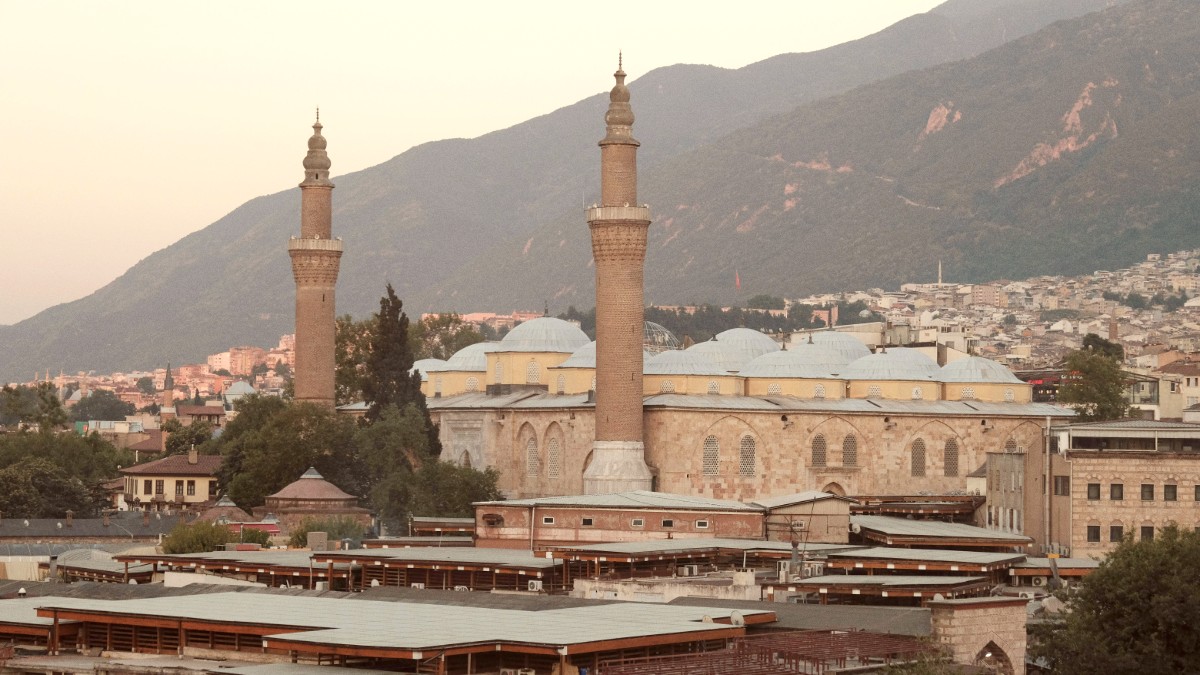
Turkey
Food explorers enjoy an unique cuisine, including the famous İskender Kebap. Bursa delivers an authentic Turkish encounter, often less crowded than coastal resorts or Istanbul, yet with modern conveniences and a warm atmosphere.
Bursa’s appeal comes from keeping its historical character while welcoming modern growth. The old city, with its narrow lanes and traditional Ottoman residences, invites leisurely walks. New districts like Nilüfer feature contemporary shopping areas, wide avenues, and a dynamic urban life.
The city also serves as an agricultural center, known for its peaches and chestnuts. Its natural hot springs, utilized since Roman times, position it as a wellness destination. These springs appear in many hotels and traditional hammams, offering a rejuvenating visit.
Bursa situates in Türkiye’s Marmara Region, about 150 kilometers (93 miles) south of Istanbul. The city rests on the northwestern slopes of Uludağ, a prominent mountain shaping Bursa’s skyline. Uludağ, known anciently as Mount Olympos of Bithynia, draws visitors for winter skiing and summer hiking. Its presence shapes Bursa's climate and leisure options.
The city's location places it near the Marmara Sea coast. Towns like Mudanya and Güzelyalı, ferry ports for Istanbul, are a short drive away. This closeness to the sea adds another dimension to Bursa’s geography, with coastal trips and fresh seafood. Fertile plains around Bursa, fed by mountain streams, maintain extensive agriculture, including orchards and olive groves.
Dominant feature, winter sports, summer hiking.
Coastal towns, ferry access to Istanbul.
Supports widespread agriculture, orchards.
City spreads from plains to mountain slopes.
Geological reality in local construction.
Bursa holds immense historical meaning for Türkiye, specifically as the Ottoman Empire's birthplace. Its history stretches to ancient times, with settlements from the Bithynian and Roman periods. Its most distinguished era began in 1326 when Osman Gazi, the Ottoman Empire's founder, took it from the Byzantines.
This event established Bursa as the nascent Ottoman state's first major capital, a role it held until Edirne’s capture in 1363. As capital, Bursa thrived as a hub of trade, culture, and religious scholarship. Early Ottoman sultans commissioned numerous mosques, madrasas, hammams, and hans, many standing today. These structures are fine examples of early Ottoman architecture, shaping imperial styles for centuries.
The Grand Mosque (Ulu Camii), the Green Mosque (Yeşil Cami), and the Muradiye Complex are direct legacies of this time. Bursa's location on major trade routes, especially the Silk Road, contributed to its prosperity. Koza Han, the silk bazaar, remains a testament to this thriving commerce. Even after losing capital status, Bursa stayed an important administrative, religious, and commercial center.
The city’s historical layers offer a tangible link to the origins of one of the world's longest-lasting empires, a compelling stop for anyone interested in imperial history.
Travelers discover a city where ancient customs share space with modern conveniences. The city's geographical spot, between Uludağ mountain and the Marmara Sea, features various activities, from skiing and hiking to coastal town exploration.
The core of Bursa highlights its Ottoman history. Visitors walk through the Grand Mosque, admire the intricate tilework of the Green Mosque and Tomb, and soak in the lively atmosphere of Koza Han, the historic silk market. Osman Gazi and Orhan Gazi's tombs, Ottoman Empire founders, rest in Tophane Park, with sweeping city views.
Bursa offers a rich food journey. İskender Kebap, served with hot butter and yogurt, is a must-try. The city also features local specialties, including candied chestnuts (Kestane Şekeri).
Public transportation in Bursa operates efficiently, with a metro system, buses, and trams making city exploration simple. The Uludağ Teleferik, a long cable car, gives stunning views and direct access to the mountain resort.
Bursa delivers a welcoming and authentic Turkish experience, making it a rewarding stop for those seeking cultural immersion, outdoor adventures, or a relaxing break. Its modest cost compared to some other major Turkish cities also makes it an appealing option.
These sites collectively share the story of an empire's beginnings.